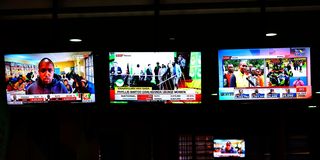Reimagine support for African media

A picture of different TV stations streaming their provisional presidential results in a picture taken on August 11, 2022.
If you grew up in Kenya in the past three decades, you might remember 4pm as a crucial time when the single television channel, KBC, started its programming—probably in black and white, depending on your TV set. Today, thanks to technology, most of us in Kenya can access dozens of TV and radio channels at our fingertips.
Yet, we have witnessed the once-thick newspapers grow ever thinner and radio and TV stations scrap popular news shows as a result of regular waves of media house layoffs.
These cuts in the Kenyan media industry are, unfortunately, common. Driven by dire global economic times, technological advancements, pandemic-related aftershock and other factors, their financial woes are emblematic of a weakened media ecosystem across Africa.
That forces us all to rethink how we can, and should, support the industry, including native digital media, to thrive, so that it can maintain its independence and its place as a stalwart pillar of democracy.
Africa’s young mobile-first population increasingly access information online. But a 2022 Afrobarometer report “Promise and Peril” shows most Africans primarily rely on TV, radio and newspapers as trusted news sources. Digital access and usage doubled in the past three years but radio remains the most pervasive channel of information.
Media influences how citizens engage with the government. We have moved from an inaccessible political leadership who rarely offered interviews to media, let alone interactions with their constituents, to watching live parliamentary discussions. Top political leaders now attend debates with their peers and the public on live broadcasts.
However, while content and programming has evolved, many media businesses still heavily rely on older business formats with commercial advertisement as a single income stream. With the Covid-19 economic fallout and technological growth, advertising fell drastically and might never rebound.
We are witnessing the effects of these losses. During the 2022 elections, media outlets stationed thousands of journalists across the country. They maintained constant coverage of events being relayed from polling stations from the 47 counties and the national tallying centre. I was glued to my TV, radio and phone the entire time, witnessing this monumental part of our democratic process.
Robust, independent media
It was, therefore, disheartening to see journalists being laid off, or face salary delays or cuts recently, limiting their ability to give us the expansive coverage we are accustomed to, especially as we need a robust, independent media industry to further connect Kenyans to their new government and to the world.
During these times of constant flux, what can friends of the media do to bring it back from the precipice, and support it?
Digital media’s innovation presents opportunities for growth. As young democracies, political participation in Africa depends on sustained engagement with majority youth populations—online and in the media.
Luminate’s 2021 Inflection Point International report studied impact, innovation, threats, and sustainability of digital media entrepreneurs in Africa and other parts of the world.
Increased funding helped the digital media space ride out the pandemic but donors worry that this could create an over-reliance on grant funding. It will take creative interventions, and collaboration, to protect the important gains in governance that have been made possible with the help of the media ecosystem.
The government acknowledges the problem: The Ministry of Information, Communication and Technology recently indicated that it might spend more on advertising in the media. That could ease the struggling in the media businesses, for now.
In my work, I aim to ensure that everybody—especially those who are under-represented—have the information, and power, to influence the decisions that affect us all.
An inclusive democracy is built on access to reliable, accurate information. The importance of building allies who are committed to reinvigorate our media cannot be overstated.
That is why the February 14-15 Africa Media Festival, which we co-convened in Nairobi with our partner Baraza Media Lab, brings together African veteran journalists, filmmakers, media owners and associations, journalism students, new media practitioners and content creators to reimagine media in the continent. This is a chance to reflect on our existing knowledge and build an African media ecosystem that can weather storms.
Kenya is a world-renowned media and technological hub that we can prime to refashion as a model for sustainable media businesses.
Mr Noormohamed is vice-president-Africa at Luminate. [email protected]. @ainoormohamed





